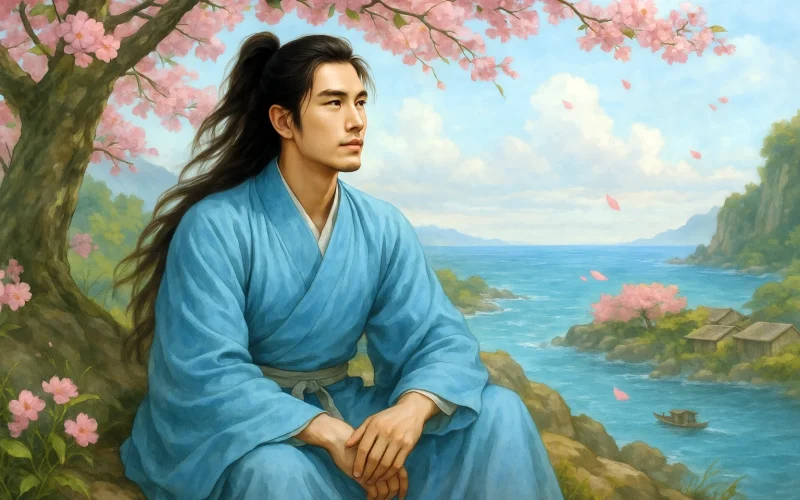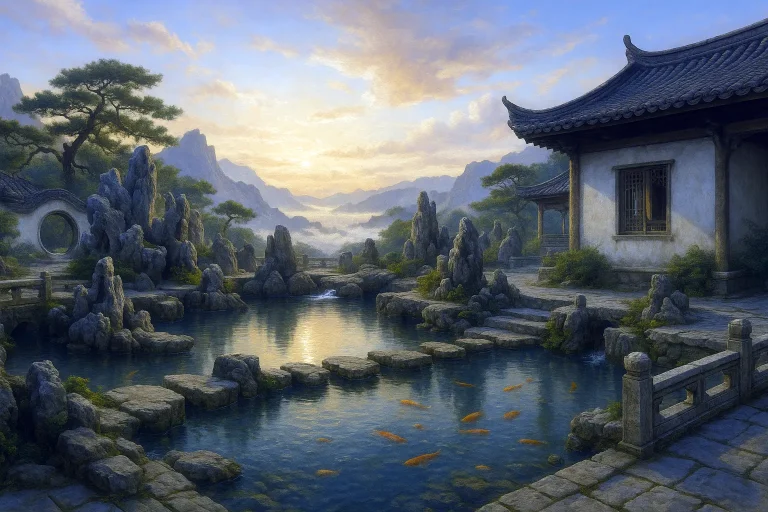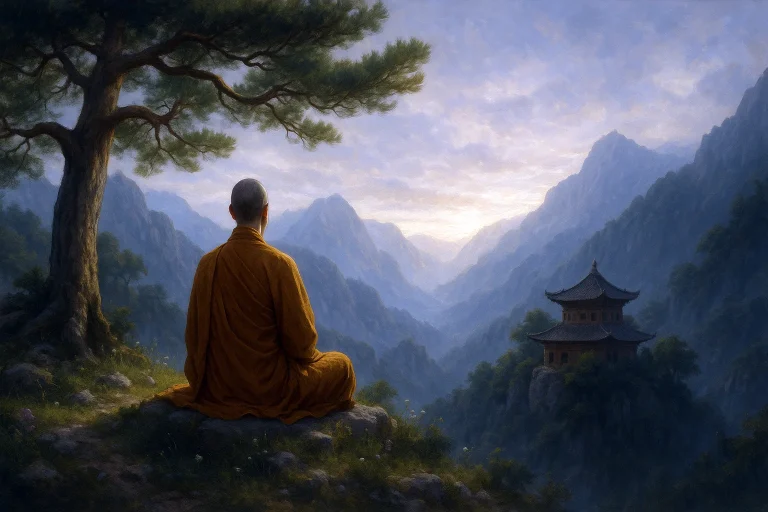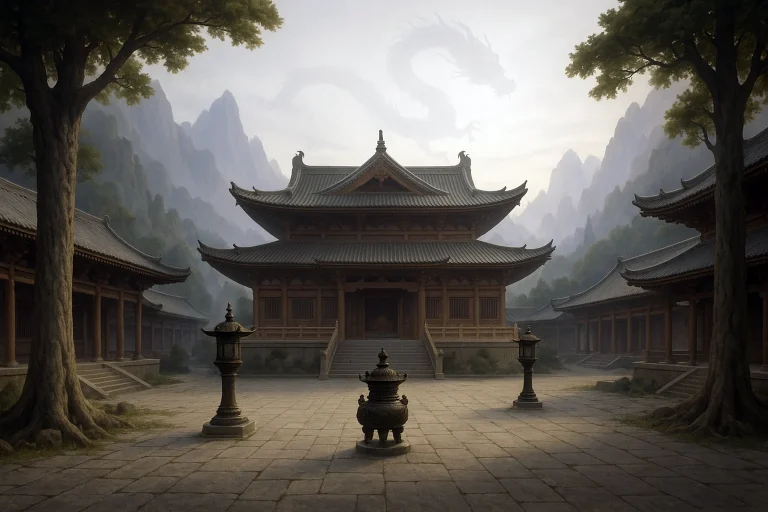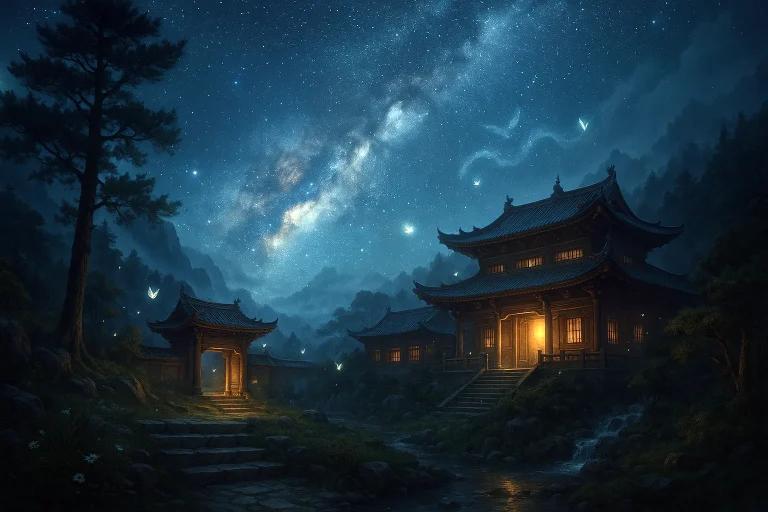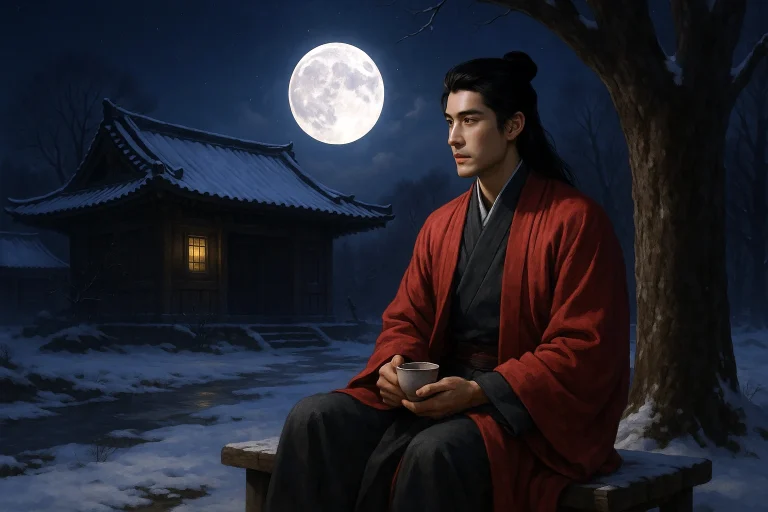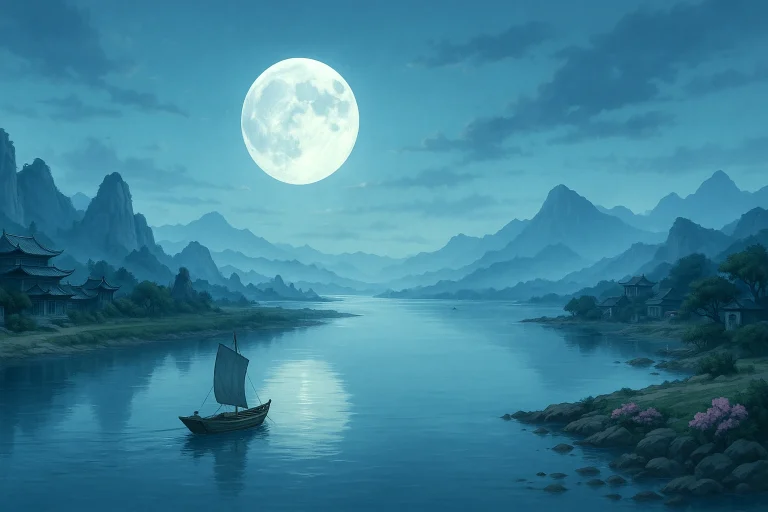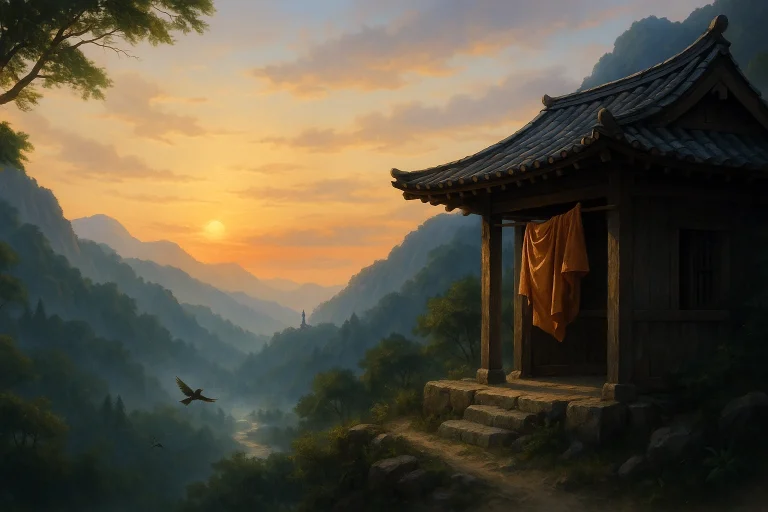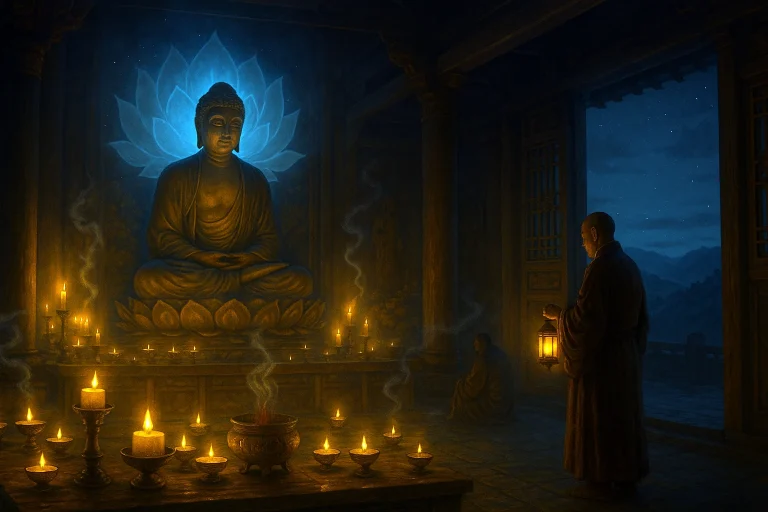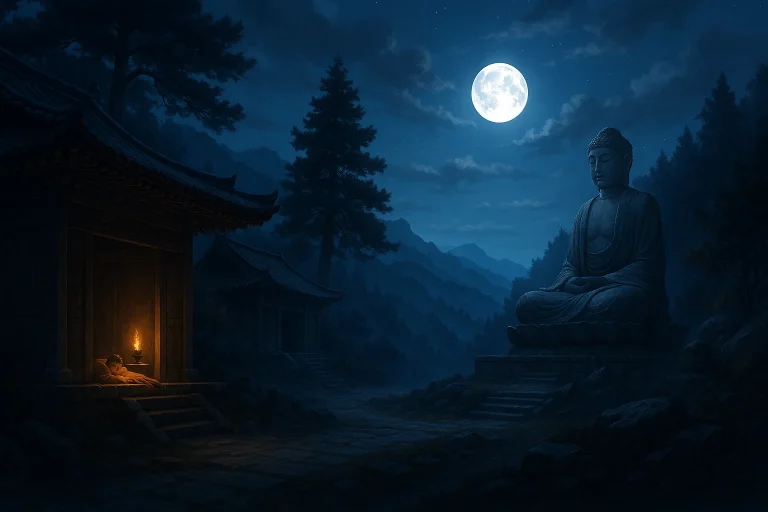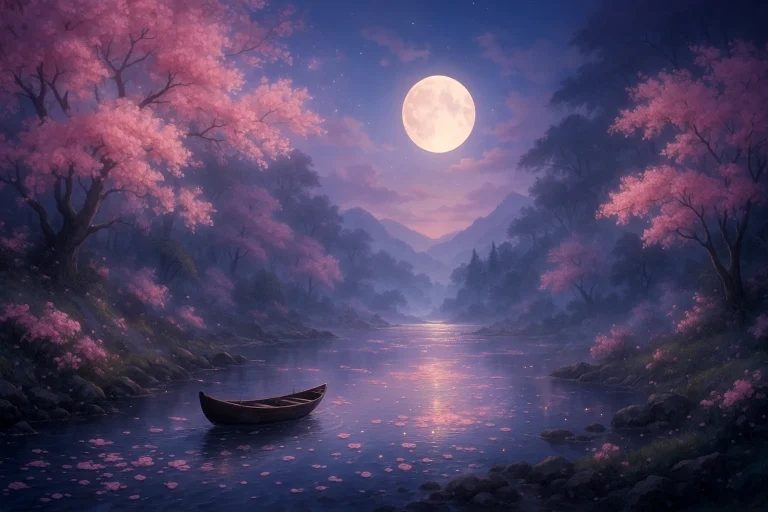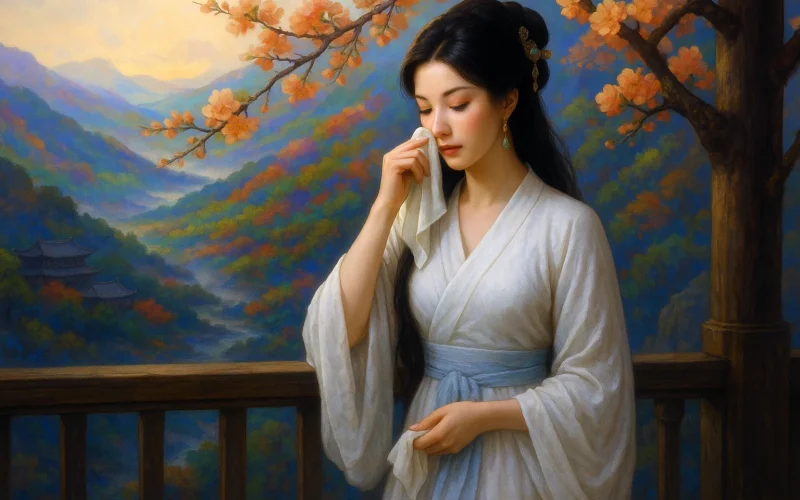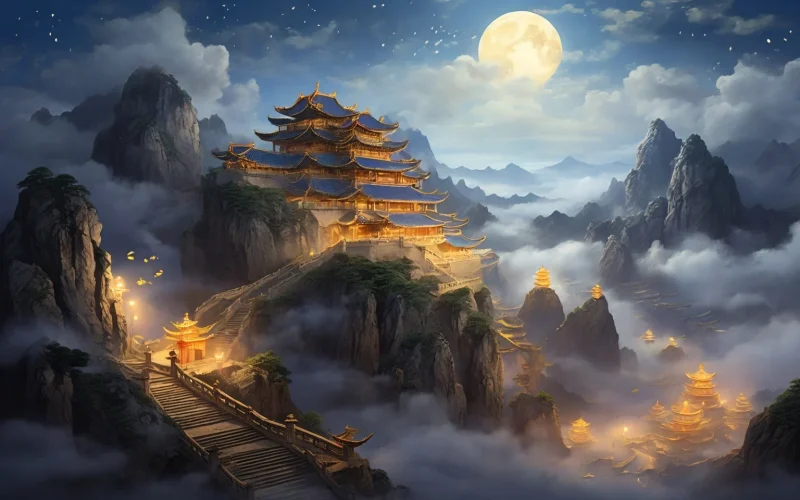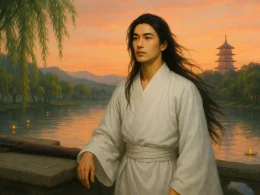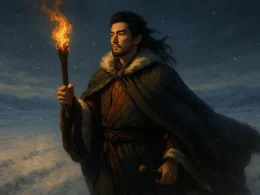Qiwu Qian (綦毋潜 692–c. 755), a native of Ganzhou (modern-day Ganzhou, Jiangxi), was a representative poet of the Landscape and Pastoral School during the High Tang period. He earned the jinshi degree in 726 (the 14th year of the Kaiyuan era) and held official positions such as Right Reminder (You Shiyi) and Editorial Director (Zhuzuo Lang) before retiring to the Jiangnan region. His poetry, renowned for its depictions of reclusive life and natural landscapes, is characterized by a serene and understated style. He exchanged poetic works with Wang Wei, Meng Haoran, and other literary figures. The Complete Tang Poems (Quan Tangshi) preserves 26 of his poems, which stand out distinctly within the High Tang landscape poetry tradition and significantly influenced the development of later Zen-inspired poetry.
Major works
Life
Qiwu Qian, courtesy name Xiaotong (or Jitong), was born around 691 (the 2nd year of the Tianshou era under Empress Wu Zetian) and died around 756 (the 1st year of the Zhide era under Emperor Suzong). His ancestral home is debated, with sources pointing to either Qianzhou (modern-day Nankang District, Ganzhou, Jiangxi) or Jingnan (modern-day Jiangling, Hubei). He was an important figure in the High Tang Landscape and Pastoral School.
In his early years, Qiwu Qian traveled extensively, visiting regions such as Jianghuai and Jingxiang, which enriched his life experiences. In 726 (the 14th year of the Kaiyuan era), he passed the imperial examinations alongside the renowned poet Chu Guangxi, marking the beginning of his official career. After earning the jinshi degree, he was initially appointed as the County Defender (Xianwei) of Yishou (modern-day Zhouzhi, Shaanxi). Around 730 (the 18th year of the Kaiyuan era), his literary talents earned him a transfer to the capital, where he served as an Academician-in-Waiting (Daizhi) at the Jixian Academy, participating in the collation of important court texts. Later, he was promoted to Right Reminder (You Shiyi), a key advisory position. In the winter of 733 (the 21st year of the Kaiyuan era), his friend and fellow poet Chu Guangxi resigned from office and returned home, prompting Qiwu Qian to compose a farewell poem. Around 741 (the end of the Kaiyuan era), he was promoted again to Editorial Director (Zhuzuo Lang), overseeing the drafting of imperial inscriptions, prayers, and ceremonial texts.
In the later years of the High Tang, social tensions escalated. Around 755 (the 14th year of the Tianbao era), on the eve of the An Lushan Rebellion, Qiwu Qian—perhaps disillusioned with the political situation or facing personal career setbacks—chose to resign and retreat into seclusion. Historical records suggest two possible locations for his retirement: Jiangdong (modern-day Jiangsu-Zhejiang region) or his hometown in Qianzhou. Even in seclusion, he remained engaged with literary circles, exchanging poems with prominent figures like Wang Wei, Li Qi, Gao Shi, and Wei Yingwu. His friendship with Wang Wei was particularly close, as evidenced by several poems Wang Wei dedicated to him. Qiwu Qian likely passed away during or shortly after the An Lushan Rebellion, around the age of sixty.
Artistic Style
Qiwu Qian’s poetry is most celebrated for its landscape and pastoral themes, making him a key figure in the High Tang Landscape and Pastoral School. His style, deeply influenced by his close friend Wang Wei, exhibits distinct personal characteristics.
The defining feature of Qiwu Qian’s poetry is its elegant serenity. His writing is fresh and luminous, particularly adept at capturing tranquil natural scenes and evoking ethereal, understated moods. His observations of nature are meticulous, and his depictions are refined and delicate, often highlighting the secluded beauty of mountains, streams, and temples. His masterpiece, Spring Drifting on the Ruoye Stream (Chun Fan Ruoye Xi), exemplifies this style. Influenced by the zeitgeist and Wang Wei’s fusion of poetry and Zen Buddhism, Qiwu Qian’s landscape poetry frequently incorporates Buddhist philosophy. While portraying natural beauty, his verses reveal a transcendent, contemplative mindset, adding depth and lasting resonance to their imagery. Poems like Inscribed on the Chan Master Xuan’s Room at Zhao Yin Temple (Ti Zhaoyinsi Xuangong Fang) and Inscribed on the Mountain-Top Chan Temple at Lingyin Monastery (Ti Lingyinsi Shanding Chanyuan) embody this quality. His language is concise and fluid, eschewing ornate embellishments in favor of precise, vivid expression. The overall tone of his poetry is refined and otherworldly, reflecting his yearning for reclusive living and his pursuit of moral purity.
Representative Works (Exemplifying Core Style):
- Spring Drifting on the Ruoye Stream (Chun Fan Ruoye Xi):
"My secluded thoughts never cease; / This journey follows chance encounters. / Evening breeze guides the drifting boat; / Flower-lined paths lead to the stream’s mouth. / At nightfall, we turn west through valleys; / Beyond mountains, the Southern Dipper gleams. / Mist over the pool drifts lazily; / Forest moon sinks slowly behind. / Life’s affairs are but a haze— / I long to be an old man with a fishing rod."
This poem epitomizes Qiwu Qian’s style. Guided by the theme of "secluded thoughts," it depicts a quiet night scene on the Ruoye Stream: the evening breeze, flower-lined paths, shifting valleys, distant stars, misty pools, and sinking moon create an ethereal, serene atmosphere. The closing line, "I long to be an old man with a fishing rod," seamlessly merges the natural beauty with a transcendent, reclusive spirit, achieving profound artistic resonance. - Inscribed on the Mountain-Top Chan Temple at Lingyin Monastery (Ti Lingyinsi Shanding Chanyuan):
"This temple crowns the mountain peak, / Cut off from the world below. / Pagoda shadows hang in the clear Han; / Bell tones harmonize with white clouds. / In emptiness, the meditation room closes; / On the path, incense burns in abundance. / Pause here, westward-bound traveler— / For humans and heavens, the sun still lingers."
This poem emphasizes the temple’s transcendent isolation. The couplet "Pagoda shadows hang in the clear Han; / Bell tones harmonize with white clouds" masterfully combines architecture (pagoda shadows), celestial imagery (clear Han), sound (bell tones), and nature (white clouds), creating a lofty, serene, and harmonious Zen-infused atmosphere. Critics like Yin Fan praised this couplet as "unprecedented in history." - Passing by Monk Rong’s Hermitage (Guo Rong Shangren Lanruo):
"A monk’s robe hangs in the mountain-top retreat; / Outside the window, only stream birds in flight. / Dusk halfway down the mountain path— / Yet I linger, drawn by spring’s voice clinging to emerald hues."
This poem is exceptionally concise, using just a few vivid images—the hanging robe, flying birds, and murmuring spring—to evoke the hermitage’s solitude and natural vitality. The poet’s reluctance to leave, captivated by the spring’s sound amid twilight, reveals a quiet yet lively emotional depth.
Legacy
Qiwu Qian holds a significant place in High Tang poetry, with his influence manifesting in several ways:
As a key member of the High Tang Landscape and Pastoral School, he contributed alongside Wang Wei, Meng Haoran, Chu Guangxi, and Zu Yong to the school’s brilliance. His unique skill in crafting serene, Zen-infused landscapes enriched and deepened the school’s artistic scope.
During the High Tang, Qiwu Qian enjoyed considerable renown, often paired with Wang Wei in literary discussions. Wang Wei praised him in Seeing Qiwu Qian Home After Failing the Imperial Exam (Song Qiwu Qian Luo Di Huan Xiang): "You excel in the Jiangzuo style, / Mastering the Jian’an tradition with grace" (though consolatory, this reflects genuine esteem). The poet Li Qi also lauded him in Seeing Qiwu Qian Off to Visit Vice-Director Fang (Song Qiwu San Ye Fang Geishi): "Under your great name, / Your home lacks stored grain… / Your poetic fame leads the age." Yin Fan’s influential anthology Collection of Heroes from Rivers and Peaks (Heyue Yingling Ji) included six of Qiwu Qian’s poems—a substantial number—and praised him highly: "Qian’s poetry stands steep and exquisite, rich in fine lines, adept at conveying transcendent moods. Lines like ‘Pines shade the cold mountain hall’ are rare gems; ‘Pagoda shadows hang in the clear Han, / Bell tones harmonize with white clouds’ are unparalleled in history. For centuries in Jingnan, he alone shines." These accolades affirm his prominence in Tang literary circles.
Though Qiwu Qian’s fame did not endure as Wang Wei’s or Meng Haoran’s did, his elegant, nature-infused, Zen-inspired style continues to captivate scholars and poetry enthusiasts. His works are recognized as indispensable to the High Tang landscape poetry tradition, offering valuable insights into its diversity. His seamless integration of Zen philosophy into natural imagery also inspired later poets. Additionally, his poems and exchanges with figures like Wang Wei and Chu Guangxi hold documentary value, serving as key materials for studying High Tang literary networks, reclusive culture, and the evolution of landscape poetry.






